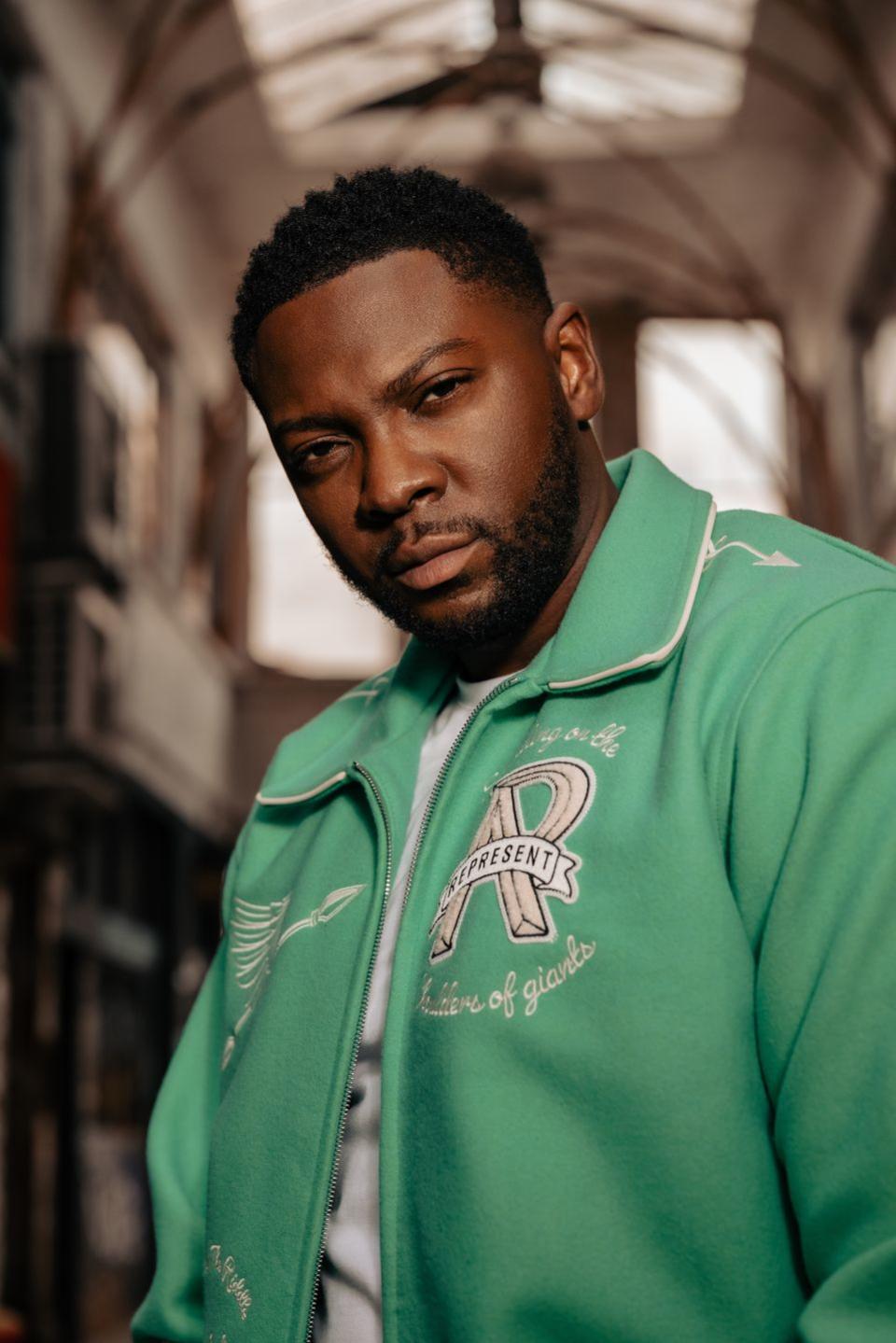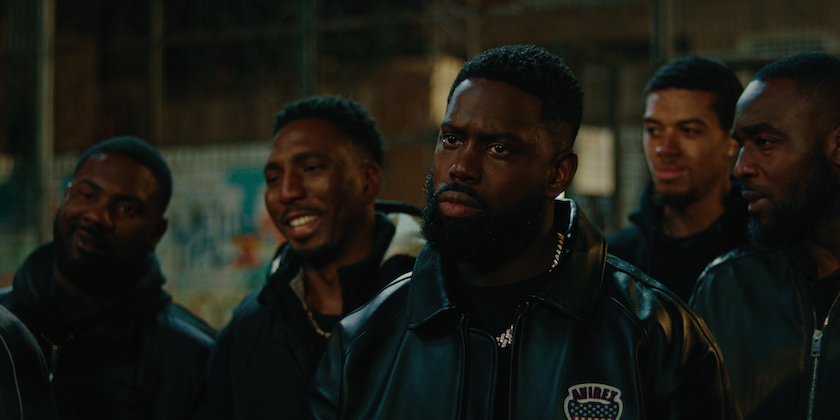Supacell creator Rapman is taking over the sci-fi genre
Imagine waking up one day to find out you have superpowers. Would you try to save the world, or would you save yourself first? This is the premise of Netflix's brand new sci-fi drama, Supacell, created by Rapman.
The groundbreaking series, which is out now, sees a group of five ordinary people who have their lives turned upside down when they realise they have superhuman abilities. They have little in common except for one thing: they are all Black south Londoners.
From superhuman strength, to the ability to time travel and fly, the group use their skills in the only way they know how, to protect themselves and their loved ones, with Michael Lasaki (Tosin Cole) trying to bring the five heroes together to save the woman he loves.
The series is a first of its kind for the sci-fi genre, featuring a predominately Black cast, and was imagined by the mind behind Shiro's Story and Blue Story, Rapman. So, we sat down with the Supacell creator to speak about representation, stunt sequences, cameos and what he hopes the impact of the show will be.
Warning, spoilers below!

Hi, Rapman! Where did the idea for Supacell first originate?
I was always a massive fan of the genre. I loved Heroes, Misfits, old school Batman, but I never saw a superhero story that was realistic to what a normal person would do if they had powers.
Then, I first spoke the idea out loud when I was doing promo for my film, Blue Story, and wondered what people from ends like south London would do with powers. Then, in 2020, I started writing and developing the show.
Who and what were some of your inspirations for creation of the series?
I wanted characters who were normal people. They're not special, they're flawed and to some of them, the powers are a blessing and to others, it's a curse. For example, Sabrina doesn't want the powers but Rodney and Tazer love them.
I wanted a show where you would still be entertained if you took the superpowers away, and I feel like you could still enjoy watching these five characters and their stories.

Why did you choose south London as the backdrop of the series? What makes this setting so unique?
It's where I'm born and raised, I'm a proper south Londoner. I've lived in Lewisham, Catford, Deptford, I know south London better than anywhere. I've had so many firsts there, it's my home so I wanted to put it on the map.
I don't think I've seen a show that represents what south London is really like, so no other series is doing it like Supacell.
The characters are less like superheroes, and more like your average person. Why did you choose that angle?
I like to tell grounding stories. It might be heightened with superpowers, VFX but it's easier to connect to a character when you can relate to them. I've met a kid like Tazer, we meet delivery drivers like Michael every day but don't know what they're going through. So, no matter how sci-fi this gets, the characters need to stay real.
There’s some exciting cameos in the series, how did they come about?
So, with Ghetts, we needed someone to play the bad guy and we originally had a BAFTA-award winning actor in the cast, but they pulled out. I wanted someone big, but we couldn't find actors with as much gravitas and my executive producer suggested Ghetts. So, we asked him to audition and he killed it.

Then, with Digga D, I pictured him when writing the character but I didn't know him, or Ghetts. So, I reached out to people who knew them and with Digga D, his album just went to number one so I wasn't sure if he would audition, but he did and Netflix saw the tape and loved it.
We've got Castillo, too, who my director and producer suggested and he did really well.
Were there any challenges you faced in the creation of Supacell?
Once Netflix signed on to develop it, it meant they liked the idea but there were many challenges. There were times where I wanted more time on set or, for example, they thought a scene was too violent but I thought the violence was needed to get the message across.
There were some creative differences as you have myself, who is the showrunner and creator, and the streaming platform. You have to be very strong-minded, as if you have multiple people telling you no, you need to stay firm and everyone has different opinions. But, when we did screenings early on, audiences loved it.
How do you balance positive representation, with telling stories that are true to you?
I write a show that I want to watch. I make it for me and hope the rest of the world enjoys it, but I'm creating shows that I, as a viewer, would find entertaining. So, if I start worrying about everyone's opinions, I'd never create a show. If there's 10 people in the room, there's 10 different opinions.
In Supacell, it's funny, dangerous, entertaining and emotional. You get positive Black experiences with Michael and Dion, the sisters, the father and son alongside the gritty, street element. It's got a bit of everything but if it's too heavy for you, there's other shows. If you want better, write your own. That's what I did, I started creating stories for YouTube.
What were some of your favourite on-set moments with the cast?
There's a scene in episode one where Michael travels to the future, and we see Sabrina flying in the air, Andre lifting a car and more. It's set in Piccadilly Circus, but wasn't actually filmed there so we built the set from scratch and added CGI. There was a 30 foot tall, 360 degree green screen.
When I walked on set, it looked crazy as you don't even see that in Hollywood. Everyone was gassed and we had even had a set visit from Michael Ward. There were many other moments, but everyone was together that day and it's rare to see all the leads in one scene, so that was a good day.

The series reveals that the sickle cell disease trait is what causes the superpowers. Why did you choose that storyline?
It always hurt me that there is a disease that mainly affects people with dark skin. Then, it was around the time of George Floyd's murder, which was massive and the Black community were hurt.
People were doing their part and using their voices to protest, TV channels were airing Black stories and for me, I wanted to make a difference by uplifting Black people. To me, sickle cell disease didn't have enough awareness despite so many people suffering with it.
So, if there is a disease that makes Black people weak, I thought, is there a disease that makes Black people strong? I wanted to flip it on its head, raise awareness and make people with sickle cell disease feel seen and heard. I hope it helps people.
What do you hope viewers take away from the series?
I obviously want people to enjoy it and be entertained, but I want this to open doors for more high calibre, Black stories. I want to see Black zombie movies, Black fantasy stories like Game of Thrones, Black wizards and magicians like Harry Potter.
This way, Black actors and creatives have more work and it opens more doors.
What are your hopes for a potential second season?
My hopes are high. I'm confident it will do well, but it's up to Netflix so we will see. But, the story has to continue and it gets crazier for the characters.
Supacell is streaming on Netflix now.
You Might Also Like

 Yahoo News
Yahoo News 
